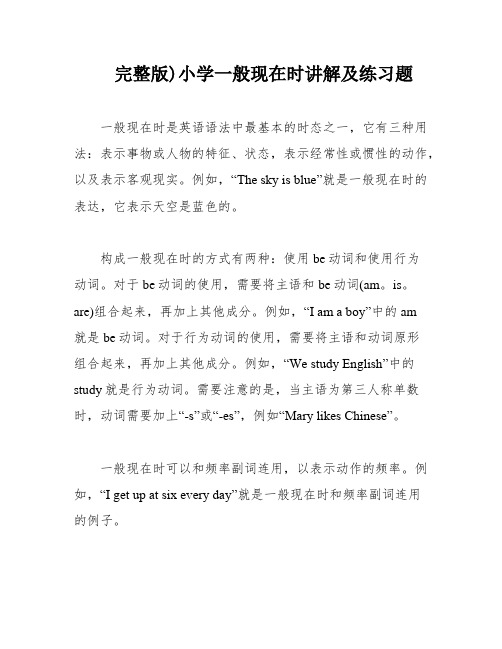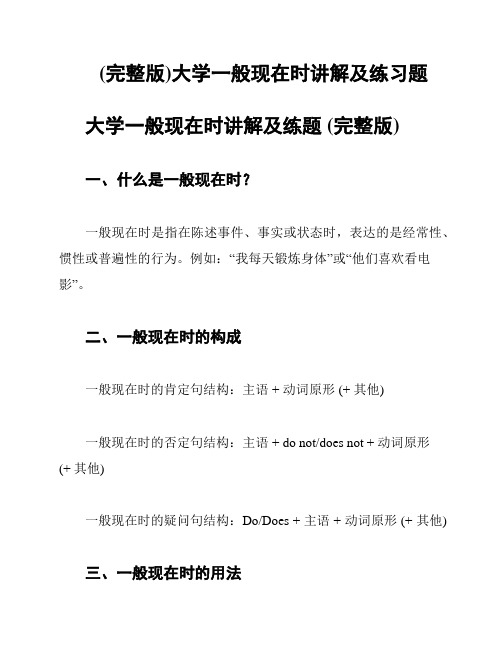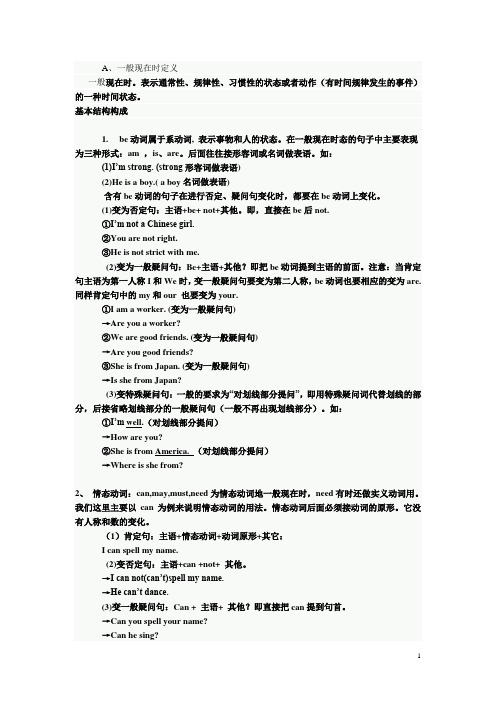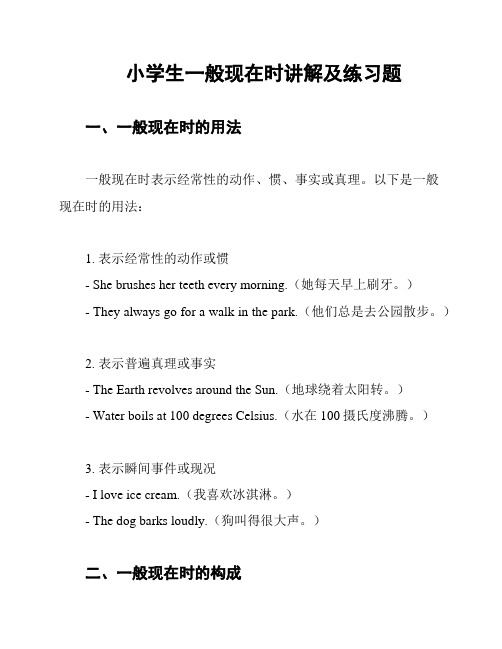(完整版)一般现在时讲解及练习
完整版)小学一般现在时讲解及练习题

完整版)小学一般现在时讲解及练习题一般现在时是英语语法中最基本的时态之一,它有三种用法:表示事物或人物的特征、状态,表示经常性或惯性的动作,以及表示客观现实。
例如,“The sky is blue”就是一般现在时的表达,它表示天空是蓝色的。
构成一般现在时的方式有两种:使用be动词和使用行为动词。
对于be动词的使用,需要将主语和be动词(am。
is。
are)组合起来,再加上其他成分。
例如,“I am a boy”中的am就是be动词。
对于行为动词的使用,需要将主语和动词原形组合起来,再加上其他成分。
例如,“We study English”中的study就是行为动词。
需要注意的是,当主语为第三人称单数时,动词需要加上“-s”或“-es”,例如“Mary likes Chinese”。
一般现在时可以和频率副词连用,以表示动作的频率。
例如,“I get up at six every day”就是一般现在时和频率副词连用的例子。
一般现在时还可以用于构成否定句、一般疑问句和特殊疑问句。
对于be动词的否定句,需要在be动词后面加上not。
例如,“He is not a worker”就是be动词的否定句。
对于行为动词的否定句,需要在主语和动词原形之间加上don't或doesn't。
例如,“I don't like bread”和“He doesn't often play”就是行为动词的否定句。
对于一般疑问句,需要将be动词或do/does放在主语前面。
例如,“Are you a student?”就是一般疑问句。
对于特殊疑问句,需要在疑问词后面加上一般疑问句。
例如,“Where is my bike?”就是特殊疑问句。
需要注意的是,当主语为第三人称单数时,否定句和一般疑问句需要用doesn't,而不是don't或do。
例如,“He doesn't often play”和“Does she go to work by bike?”就是主语为第三人称单数时的否定句和一般疑问句。
(完整版)一般现在时态讲解及练习(精简版,错题版)

一般现在时态一、一般现在时的用法1)表示经常性、习惯性的动作或存在的状态。
通常与副词sometimes, often, usually, always, every day (year, month ), once (twice, three times) a day,等等频率副词(时间状语)连用。
e。
g。
They usually go to school by bike。
I take the medicine three times a day. 实义动词表示“动作”She helps her mother once a week.Mary’s father is a policeman.There are 50 students in my class. Be动词表示“状态”He is very busy now。
be 、do不能放一起,如果非要放一起,do后要加ing, 变成现在进行时。
2) 表示主语的特征、性格、爱好等。
e.g。
I work hard.I like watching TV.3) 表示客观真理e。
g. There are seven days in a week.The moon moves round the earth。
The sun rises in the east and sets in the west every day。
Tomorrow is Tuesday。
二、一般现在时的句子转换:三、一般现在时的结构:“主语+谓语+其它”,有时为了起强调作用,时间状语也可提前.三单变化:1)多数在动词后+s :play - plays like —likes ask———asks work———works get---gets stay-——stays2)以字母s, x, ch, sh或o结尾的动词,+-es:watch-——watches wish———wishes fix———fixes do——-d oes go---goes pass-—-passes3)以“辅音字母加 - y”结尾的动词,要先变y为i+-es。
(完整版)大学一般现在时讲解及练习题

(完整版)大学一般现在时讲解及练习题大学一般现在时讲解及练题 (完整版)一、什么是一般现在时?一般现在时是指在陈述事件、事实或状态时,表达的是经常性、惯性或普遍性的行为。
例如:“我每天锻炼身体”或“他们喜欢看电影”。
二、一般现在时的构成一般现在时的肯定句结构:主语 + 动词原形 (+ 其他)一般现在时的否定句结构:主语 + do not/does not + 动词原形(+ 其他)一般现在时的疑问句结构:Do/Does + 主语 + 动词原形 (+ 其他)三、一般现在时的用法1. 表示客观事实、真理或普遍现象,常常与表示频率的副词一起使用。
例如:“水烧开时会冒泡”。
2. 表示经常性或惯性的行为。
例如:“我每天都喝咖啡”。
3. 表示现阶段的情况或状态。
例如:“我现在住在中国”。
4. 在叙述历史事件或小说情节时,使用一般现在时可以增加紧迫感和现场感。
例如:“他打开门,走进了房间”。
四、一般现在时的练题1. 填入适当的动词形式:- She ____(have) two cats.- They ____(go) to school every day.- My father ____(work) as a doctor.2. 句子改为否定句:- I eat breakfast every morning.- She likes to read books.- We play tennis on weekends.3. 根据题意回答问题:- When do you usually go to bed? - Does he watch TV every evening? - How often does she go shopping?4. 将下列句子改为一般疑问句:- You live in London.- They play football in the park.- She enjoys dancing.五、答案1. 填入适当的动词形式:- She has two cats.has two cats.- They go to school every day.go to school every day. - My father works as a doctor.works as a doctor.2. 句子改为否定句:- I do not eat breakfast every morning.- She does not like to read books.- We do not play tennis on weekends.3. 根据题意回答问题:- I usually go to bed at 11 PM.- Yes, he watches TV every evening.- She goes shopping once a week.4. 将下列句子改为一般疑问句:- Do you live in London?- Do they play football in the park?- Does she enjoy dancing.希望以上内容对你理解和练一般现在时有所帮助!如有任何问题,请随时向我提问。
一般现在时和一般过去时讲解及练习

A、一般现在时定义一般现在时。
表示通常性、规律性、习惯性的状态或者动作(有时间规律发生的事件)的一种时间状态。
基本结构构成1. be动词属于系动词, 表示事物和人的状态。
在一般现在时态的句子中主要表现为三种形式:am ,is、are。
后面往往接形容词或名词做表语。
如:(1)I’m strong. (strong形容词做表语)(2)He is a boy.( a boy名词做表语)含有be动词的句子在进行否定、疑问句变化时,都要在be动词上变化。
(1)变为否定句:主语+be+ not+其他。
即,直接在be后not.①I’m not a Chinese girl.②You are not right.③He is not strict with me.(2)变为一般疑问句:Be+主语+其他?即把be动词提到主语的前面。
注意:当肯定句主语为第一人称I和We时,变一般疑问句要变为第二人称,be动词也要相应的变为are.同样肯定句中的my和our 也要变为your.①I am a worker. (变为一般疑问句)→Are you a worker?②We are good friends. (变为一般疑问句)→Are you good friends?③She is from Japan. (变为一般疑问句)→Is she from Japan?(3)变特殊疑问句:一般的要求为“对划线部分提问”,即用特殊疑问词代替划线的部分,后接省略划线部分的一般疑问句(一般不再出现划线部分)。
如:①I’m well.(对划线部分提问)→How are you?②She is from America. (对划线部分提问)→Where is she from?2、情态动词:can,may,must,need为情态动词地一般现在时,need有时还做实义动词用。
我们这里主要以can为例来说明情态动词的用法。
情态动词后面必须接动词的原形。
初中英语时态讲解及练习(全)

时间状语:Tomorrow, next day(week, month, year…),soon, in a few minutes, by…,the day after tomorrow, etc.
否定形式:主语+am/is/are not going to do ; 主语+will/shall not do+其他 一般疑问句:be放于句首;will/shall提到句首。
1.I ____(write, am writing, is writing, are writing) a letter now. 2.Look, it _____(begin, is beginning, am beginning, are beginning) to rain. 3.They ____(study, is studying, am studying, are studying) medicine at the Medical Institute of Chengde these days. 4.He _____(teach, am teaching, is teaching, are teaching) an English lesson at this time.
谓语动词使用过去式形式, 加ed,分为规则和不规则变 化。表示过去经常发生的动 作,也可用“used to do ” 和“would +动词原形”。
1. He____(be, was, were, been) here a moment ago. 2. They ____(be, was, were, been) here just now. 3. The scientists _____(leave, leaves, leaved, left) for America yesterday. 4. Last week we ______(visit, visited ) the Science Museum. 5. When I was a child, I often ____(play, played) football. 6. The students ran out of the classroom as soon as the bell ____(ring, rang, rung).
小学生一般现在时讲解及练习题

小学生一般现在时讲解及练习题一、一般现在时的用法一般现在时表示经常性的动作、惯、事实或真理。
以下是一般现在时的用法:1. 表示经常性的动作或惯- She brushes her teeth every morning.(她每天早上刷牙。
)- They always go for a walk in the park.(他们总是去公园散步。
)2. 表示普遍真理或事实- The Earth revolves around the Sun.(地球绕着太阳转。
)- Water boils at 100 degrees Celsius.(水在100摄氏度沸腾。
)3. 表示瞬间事件或现况- I love ice cream.(我喜欢冰淇淋。
)- The dog barks loudly.(狗叫得很大声。
)二、一般现在时的构成在一般现在时中,动词的变化相对简单。
1. 对于第三人称单数(He/She/It),动词要加-s或-es。
- He walks to school every day.(他每天走路去学校。
)- She eats an apple.(她吃一个苹果。
)- It runs fast.(它跑得很快。
)2. 对于其他人称(I/You/We/They),动词不变。
- I play soccer on weekends.(我周末踢足球。
)- You read books every night.(你每晚读书。
)- We go swimming in summer.(我们夏天去游泳。
)- They watch movies together.(他们一起看电影。
)三、练题请根据句意填入正确的动词形式。
1. My mother __________ (cook) dinner for us every evening.2. Tom and Lisa __________ (play) tennis on Saturdays.3. The sun __________ (rise) in the east.4. We __________ (study) English at school.5. Dogs __________ (bark) when they see strangers.1. cooks2. play3. rises4. study5. bark希望以上讲解和练习题对你有帮助!。
(完整版)一般现在时讲解+练习
(完整版)一般现在时讲解+练习一般现在时一、定义与讲解一般现在时:表示经常性的事情,经常性的动作或一般性事实。
时间状语:often 经常,usually通常,always 总是,every每个,sometimes 有时,at …在几点钟只有在第三人称单数用动词的“三单变化”,其他用动词的原形。
三单变化:1.多数在动词后+s play — plays like — likes(1)直接在动词词尾加-s. 如:ask---asks work---works get---gets stay---stays(2)以字母s, x, ch, sh或o结尾的动词,在词尾直接加-es.watch---watches wash—washes fix---fixes do---does go---goes pass---passes(3)以“辅音字母加 - y”结尾的动词,要先变y为i再加-es.try---tries study---studies cry---cries fly---flies二、一般现在时的用法表示经常性或习惯性的动作或存在的状态;表示客观事实或普遍真理;在时间、条件等状语从句中,用现在时表示将来;在某些以here,there开头的句子中,用一般现在时表示正在发生的动作当主语是第三人称单数时:1、动词变相应的第三人称单数形式2、肯定句主语+动词s+其它3、否定句主语+doesn't+动词原形+其它4、一般疑问句Does+主语+动词原形+其它5、肯定回答 Yes,主语+does6、否定回答 No,主语+doesn't7、特殊疑问句特殊疑问词+一般疑问句当主语不是第三人称单数时:1、肯定句主语+动词原形+其它2、否定句主语+don't+动词原形+其它3、一般疑问句 Do+主语+动词原形+其它4、要注意,句式结构错则全都错。
5、谓语动词的形式:do/does一般现在时练习一、用所给词的正确形式填空1. We often ___________ (play) on the playground.2. He _________ (get) up at six o’clock.3. __________you _________ (brush) your teeth every morning.4. What____ (do) he usually _____ (do) after school?5. Danny _______ (study) English, Chinese, Math, Science and Art at school.6. Mike sometimes __________ (go) to the park with his sister.7. At eight at night, she ________ (watch) TV with his parents.8. ________ Mike________ (read) English every day?9. How many lessons ______your classmate____ (have) on Monday?10. What time ____his mother_________ (do) the housework?11. He often ______ (have) dinner at home. 12. Daniel and Tommy___ (be) in Class One. 13. We____ (not watch) TV on Monday. 14. Nick _____(not go) to the zoo on Sunday.15. They______ (like) the World Cup? 16. What ____they often ____ (do) on Saturdays17. Your parents________ (read) newspapers every day?18. The girl______ (teach) us English on Sundays.19. She and I _______ (take) a walk together every evening.20. There_______ (be) some water in the bottle. 21. Mike ______ (like) cooking.22. They_______ (have) the same hobby. 23. My aunt______ (look) after her baby carefully.24. You always____ (do) your homework well. 25. I_____ (be) ill. I’m sta ying in bed.26. She_____ (go) to school from Monday to Friday. 27. Liu Tao _____ (do) not like PE.28. The child often______ (watch) TV in the evening.29. Su Hai and Su Yang ______(have) eight lessons this term.30. -What day ______(be) it today? -It’s Saturday.31. Don’t make a noise. Grandpa __________ (sleep).32. Tom’s family__________ (watch) TV.33. It ________ (take) me two hours to finish my homework last night.34. What ______ your mother _______ (do) every evening? She_______ (wash) clothes.35. _______ it ______ (rain) every day?36. What _______ (do) you _______ on Sundays? We ________ (play) football.37. There ________ (be) a football match on TV every morning.38. They often ________ (visit) the Great Wall.39. Who _______ (dance) the best in your class?40. He _____________ (not come).41. The earth __________ (move) round the sun.42 She ________ (buy) a sweater.43. Mr. Wang often______ (go) to Shanghai.二、改句子1. Do you often play football after school? (肯定回答)_______________________________2. I have many books. (改为否定句)_______________________________3. Gao Shan's sister likes playing table tennis (改为否定句)________________________4. She lives in a small town near New York. (改为一般疑问句)________________________5. I watch TV every day. (改为一般疑问句)________________________6. David has a goal. (改为一般疑问句)________________________7. We have four lessons.(否定句)________________________8. Nancy doesn’t run fast (肯定句)________________________9. My dog runs fast. (一般疑问句) ________________________(把10—14小题变否定句,一般疑问句和划线提问)10. Mike has two letters for him. ________________________11. I usually play football on Friday afternoon.________________________12. Su Yang usually washes some clothes on Saturday. ________________________13. Mingming usually waters the flowers every day. ________________________14. Tom does his homework at home. ________________________三、写出下列动词的第三人称单数形式:1. wash_________ match _______ guess______ study______finish_________ go________ snow______ carry_________2. stop______ see________ drive ________let_______ carry______keep_____ join______ find_______ think________ teach______ catch______3. stay_______ begin______ forget_______ lie________ die _______run_______ prefer______ give________ ring_______ dance______ hope_______四、单项选择:1. There _____ an English film at the cinema now.A. will haveB. is going to haveC. is going to beD. is2. The picture _______ nice. A. looks B. is looked C. look D. is looking3. She ______ down and soon falls asleep. A. live B. lain C. laidD. sits4. They _____ the office in time very morning. A. reach to B. arrived C. went D. get to5. We shall go to Shanghai on business before you _____ back next week.A. will comeB. cameC. would comeD. come6. The plane ______ over there. A. is B. are C.am D. was7. I see her ____ the room this morning. A. to enter B. enteredC. enterD. enters8. The teacher ________us to come to school on time. A. ask B. asking C. asks D. asked9. John always ______ others. A. help B. helping C. helps D. to help10. He ______for eight hours every day. A. working B. to workC. worksD. worked11. You’d better ______ at home and ______ your homework.A. to stay, doB. stay, doC. to stay, to doD. stay, to do12. He sits down and ______ a rest. A. having B. have C. to haveD. has13. Uncle Wang never ______ a cake. A. make B. to make C. making D. makes五、请写出下列句子1.他每天早上七点乘公交车去上学。
一般现在时讲解及练习题
欢迎下载一般现在时讲解及练习题一般现在时①表示现在的状态,如:She is ten. Kate is in the classroom. ②表示经常发生或习惯性的动作或状态,如:We often call to each other.我们时常相互通信。
③表示主语现在的性格、特征、能力,如: I like English. We can speak English.I.当谓语动词是be 时谓语动词be 包括am,is ,are.其用法是:我(I )用am; 你(you )用 are; is 用于他(him )她(her )它(it );复 数人称都用are.主要句式:1 .肯定句式 主语+be(am,are,is) +其他。
2 .否定句式 主语+be(am,are,is)+not +其他。
3 .一般疑问句 将提前be(am,are,is), 即:Be(am,are,is) + 主语 + 其他?肯定回答Yes,主语(必须是代词)+be (am,are,is )否定回答No,主语(必须是代词)+be(am,are,is )+not (必须用缩写形式isn't/aren't )闯关练习I.用be 的适当形式填空欢迎下载 精品资 精品资1.---How you? ---I fine.2.I David,and my family name Green.3.---What color your clock? ---It white.4.---What this in English?---It an apple.5.Toy my brother.David mybrother,too.They my brothers.6.Look!These apple trees.7.We good students and you good teacher.8.My sister and my brother students.9.Five and three eight.10.your card number 5578?11.Where your pencils?12.These sweaters fifty dollars.13.How much his jacket?14.My brother,s birthday December 11th.15.When Kate,s birthday?II.将下面的句子变成一般疑问句并作出回答1.That is my football.2.Those are his books.3.Jim and Tom are good friends.4.My birthday is November 1st.欢迎下载精品资5.His son is twelve years old.111.将下面的句子变成否定句1.His card is on the table.2.There is some water in the bottle.3.Bob and Tony are our friends.4.There are thirty-five students in the classroom.5.The girl is his sister.II.当谓语动词是实义动词时1.当主语是第一人称(I \ we );第二人称(you)及复数时主要句式:(1)肯定句主语+实义动词+其他(2)否定句主语+don’t+实义动词+其他(3)一般疑问句Do+主语+实义动词+其他肯定回答:Yes,主语(必须是人称代词)+do. 否定回答:No,主语(必须是人称代词)+don’t.2.当主语是第三人称单数he, she, it及单数的名词时,主要句式:(1)肯定句:主语+实义动词的第三人称单数形式+其他一(2)否定句:主语+doesn’t+实义动词的原形+ 其他一欢迎下载精品资(3)一般疑问句Does +主语+实义动词的原形+其他肯定回答:Yes,主语(必须是人称代词)+does否定回答:No,主语(必须是人称代词)+doesn’t 动词第三人称单数形式变化规则:特殊变化have----has一、一般情况加s,例如:looks, likes, wants, plays,二、以ch, sh, s, x或o结尾的词,加-es,例如:teaches, washes, guesses, goes, does三、辅音字母+y结尾,变y为i力口-es,例如:carr yf carries, stud y f studies闯关练习I/将下面的句子变成一般疑问句并作出回答1.1h ave a baseball.2.Meria likes apples very much.3.He plays Ping-pang every day.4.We watch TV in the evening.5.Mr Wang often buys lots of things.6. Jane and Mary go to school at 7:30.II.将下面的句子变成否定句1.1n eed a bag for sport.2.He wants to go to a movie.3.She often goes to see Beijing Opera.欢迎下载精品资4.The girl has an egg for breakfast.5.We play basketball every day.6.My teacher knows my name.7.It sounds very interesting.IV.用所给词的适当形式填至1. her sister(have) a tennis racket?2.your friend(like) basketball?3.We(play) football every day.4.It(sound) very well.5.Jim(want) an orange.7.My mother(watch)TV in the evening.8. you(like) English?9. Mike and Li Lei(not like) eggs.10.What color your sister(like)?11. She(know) a little English.改写句子1.Do you often play football after school?(肯定回答)2.I have many books.(改为否定句)3.Gao Shan's sister likes playing tab改为否定句)欢迎下载4. She lives in a small town near New York. 疑问句)5. I watch TV every day.(改为一般疑问句)6. David has a goal.(改为一般疑问句)7. We have four lessons.(否定句)8. Nancy doesn't run f 肯定句)9. My dog runs fast.否定句:10. Mike has two letters for him.一般疑问句:I usually play football on Friday afternoon.一般疑问句: 精品资 (改为一般。
(完整)一般现在时讲解与练习(初中英语)
一般现在是讲解与练习一般现在时讲解与练习一般现在时表示经常或习惯性的动作或一般性事实。
平时与副词 every day〔每天〕,always〔总是〕 ,usually〔平时〕 ,often〔经常〕 sometimes〔有时〕 ,等时间状语连用。
1.表示事物或人物的特色、状态。
如:The sky is blue.天空是蓝色的。
2.表示经常性或习惯性的动作。
如:I get up at six every day我.每天六点起床。
3.表示客观现实。
如: The earth goes around the sun地.球绕着太阳转。
4.表示平时的喜好。
I like bananas.We don’tlike vegetables.构成: 1. be 动词:主语 +be(am,is,are)+其他。
如:I am a boy.我是一个男孩。
2.行为动词:主语 +行为动词 (+其他 )。
如:We study English.我们学习英语。
当主语为第三人称单数 (he, she,it)时,要在动词后加 "-s"或"-es"或变“ y〞为“ ies〞如: Mary likes Chinese.玛丽喜欢汉语。
Miss Gu teaches us English.顾老师教我们英语。
She studies Chinese every day她.每天学习语文。
否认句、一般疑问句、特别疑问句:1. be 动词的变化。
否认句:主语 + be + not +其他。
如: He is not a worker.他不是工人。
一般疑问句: Be +主语 +其他。
如: -Are you a student?-Yes. I am. / No, I’m not.特别疑问句:疑问词 +一般疑问句。
如: Where is my bike?2.行为动词的变化。
否认句:主语 + don’t( doesn’t ) +动词原形 (+其他 )。
最新一般现在时讲解以及练习题资料
语法讲解一:一般现在时一般现在时的讲解思路:一、定义二、一般现在时常用时间状语、时间副词三、用法:1 •肯定句:2.否定句:3.疑问句:4.特殊疑问句:一般现在时的讲解以及练习题一、定义:一般现在时表示经常或习惯性的动作,也可表示现在的状态或主语具备的性格和能力。
例:(1).表示事物或人物的特征、状态。
The sky is blue. 天空是蓝色的。
(2).表示经常性或习惯性的动作。
I get up at six every day. 我每天六点起床。
(3).表示客观现实。
The earth goes around the sun. 地球绕着太阳转。
二、一般现在时常用时间状语、时间副词In the morni ng/afterno on /eve ningevery week (day, year, mon th…)on Sun days (Mon day, Tuesday-)at ni ght, once a week,.Always 总是,usually 通常,often 经常,sometimes有时,never 从不三、用法:1 •肯定句:(1) 句中有be (am is , are )和情态动词时,①be动词时,主语是I时要用am主语是you时要用are ,其他用is②是情态动词时,后面的动词用原型③例:I am a student.You are very beautiful.She is my best friend.He can do his homework by himself(2)没有be (am is, are )动词和情态动词:主语为第三人称单数(she ,he ,it )、单数可数名词、不可数名词的,动词要按规则加上s或es;主语是复数可数名词的肯定句,动词用原形。
例:①She(He, It )likes fish. 她(他,它)喜欢鱼。
(主语为第三人称单数②The table has four legs.桌子有四条腿。
- 1、下载文档前请自行甄别文档内容的完整性,平台不提供额外的编辑、内容补充、找答案等附加服务。
- 2、"仅部分预览"的文档,不可在线预览部分如存在完整性等问题,可反馈申请退款(可完整预览的文档不适用该条件!)。
- 3、如文档侵犯您的权益,请联系客服反馈,我们会尽快为您处理(人工客服工作时间:9:00-18:30)。
一、一般现在时态
1、一般现在时态的概念
(1)、表示现在的状态(谓语多用系动词be)
(2)、表示经常或习惯性的动作(谓语是do类动词)
(3)、表示主语具备的性格和能力(谓语多是speak like enjoy)
2、be (am is are)“是”,英语中最重要的一个系动词。
do类动词,又叫实义动词。
例如:have (有),play(玩,打)等。
3、一般现在时态的动词形式
一般现在时态规定:系动词be用现在式am is are 三个形式。
do 类动词用原型或第三人称单数形式。
“原形动词+ s / es”构成“第三人称单数形式”,与单数名词变复数
名词方法一样。
(1)、一般情况,动词后直接加s
例如:brings 带来calls 打电话meets 遇见needs 需要(2)、以字母e结尾的动词,直接加s (读/ z /)例如:
Likes 喜欢takes 带走
(3)、以字母s x ch sh o结尾的动词,加es
例如:does 做goes 走,去watches 观看
(4)、以“辅音字母+ y”结尾的名词,变y为i,加es
例如:stud y →studies 学习
(思考:enjoy play have的第三人称单数形式是)
4 、一般现在时态主语与谓语动词的搭配
第一人称单数主语:I +am 或V原形
he she it
this that
第三人称单数主语单数名词不可数名词+ is ; V单三形式
动词不定式
动名词
We you they
复数主语these those + are ; V原形
复数名词
本块习题:用所给词的正确形式填空
1、I _______ ( have ) a soccer ball .
2、She ______ ( have ) two __________ ( pingpong—ball ) .
3、He ______ ( play ) sports every day .
4、We ______ ( speak ) English .
5、Tom ______ ( call ) Jim every day .
6、My daughter ______ ( like ) apples .
7、His ______ ( friend ) knows English .
8、The girl ______ ( study ) English sometimes .
9、The _______ ( boy ) often watch TV .
10、Her uncle ______ ( go ) home on foot 。
5、一般现在时态肯定句变否定句和一般疑问句的方法
I have a volleyball
否定句:I have don’t a volleyball 我没有个排球。
一般疑问句:Do you have a volleybal 你有个排球吗?
简略回答:Yes , I do . 是的,我有。
No , I don’t .不,我没有。
2、肯定句:Han Mei studies English every day . 韩梅每天学英语。
否定句:Han Mei does’t study English every day .韩美每天不学英语。
一般疑问句:Does Han Mei study English every day ?韩梅每天学英语?
简略回答: Yes , she does .是的,她学。
No , she doesn’t . 不,她不学。
本块练习题把下列肯定句变成否定句、一般疑问句,并作简略回答。
1、They like computers .
否:They ______ ______ computers .
疑:______they______ computers ? ___________- 2、He has a sports club .
否:He ______ ______ a sports club .
疑:______he_____ a sports club ? ____________ 3、We watch TV sometimes .
否:We ______ ______ TV sometimes .
疑:_____ _____ _____ TV sometimes ? ____________ 4、Tom often plays computers .
否:Tom ______ often______computer games .
疑:_____ Tom often _____ computer games ? ____________ 4、She has some basketballs .
否:She _____ ______ _____ basketballs .
疑:_____ she _____ _____ basketballs ? ____________ 6、I enjoy playing sports every day .
否:I ______ ______ playing sports every day .
疑:______ ______ ______ playing sports every day ? ____________ 7、. My daughter calls me sometimes .
否:My daughter ______ ______ me sometimes .
疑:_____ _____ daughter _____ me sometimes ? ____________ 8、The girl speaks English and Chinese .
否:The girl ______ ______ English_____ Chinese .
疑:_____ the girl _____ English _____ Chinese ? ____________
本块习题一、句型转换
1、Tom likes some fruits for lunch(一般疑问句).
______ Tom ______ ______ fruits for lunch ?
2、I like vegetables for dinner(同上).
______ ______ like vegetables for dinner?
3、The running star has lots of healthy food(否定句).
The running star______ ______ lots of healthy food
4、They have a lot of chichen . (同上)
They ______ ______ a lot of chichen
5、Do you run in the morning every day ? (假设是,回答) ________
6、Does your friend enjoy fruits for lunch ? (假设不是,回答)______
7、A lot of people like eating healthy food .(同义句)
______ people like ______ healthy food
8、My son and daughter eat lots of broccoli and milk (同义句).
My son and daughter eat ______ broccoli ______ milk。
